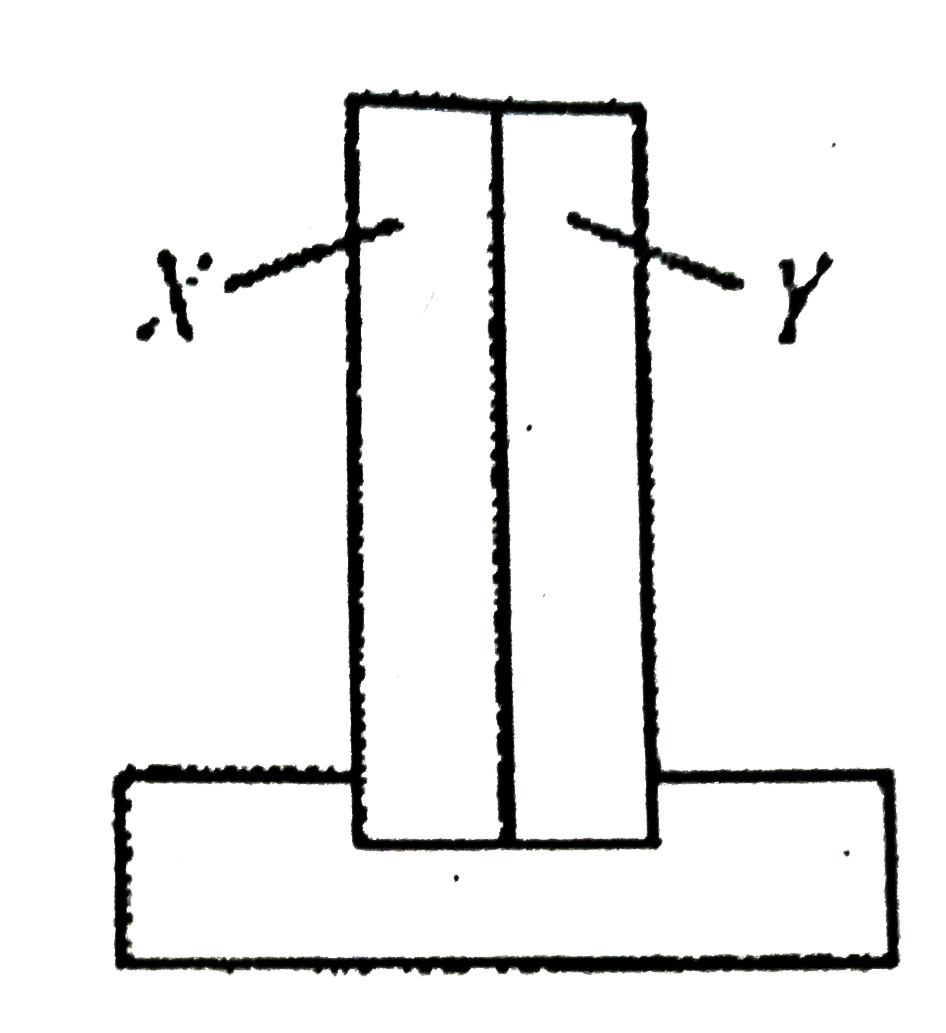If a bimetallic strip is heated it will
bend towards the metal with thermal expansion coefficient.
bend towards the metal with higher thermal expansion coefficient.
twist itself into helix.
have no bending.
The correct Answer is:A
To solve the question about what happens when a bimetallic strip is heated, we can follow these steps:
1. Understanding the Bimetallic Strip:
A bimetallic strip consists of two different metals bonded together. Each metal has a different coefficient of thermal expansion (α). When heated, these metals will expand at different rates.
2. Define Coefficients of Thermal Expansion:
Let’s denote the two metals as Metal 1 and Metal 2. Assume Metal 1 has a coefficient of thermal expansion α₁ and Metal 2 has α₂.
3. Heating the Strip:
When the bimetallic strip is heated, both metals will try to expand. However, since they have different coefficients of thermal expansion, the amount of expansion will differ.
4. Calculating Expansion:
The change in length (ΔL) for each metal can be expressed as:
- For Metal 1: ΔL₁ = L₀ * α₁ * ΔT
- For Metal 2: ΔL₂ = L₀ * α₂ * ΔT
Where L₀ is the original length of the metals and ΔT is the change in temperature.
5. Comparing Expansions:
Since α₁ and α₂ are different, we can say that:
- If α₁ > α₂, then ΔL₁ > ΔL₂ (Metal 1 expands more than Metal 2).
- If α₁ < α₂, then ΔL₁ < ΔL₂ (Metal 2 expands more than Metal 1).
6. Bending Direction:
The difference in expansion will cause the strip to bend. The strip will bend towards the metal with the lower coefficient of thermal expansion because that metal expands less than the other.
7. Conclusion:
Therefore, if a bimetallic strip is heated, it will bend towards the side of the metal with the lower coefficient of thermal expansion.
Final Answer:
When a bimetallic strip is heated, it will bend towards the metal with the lower coefficient of thermal expansion.
---
A bimetallic strip consists of two different metals bonded together. Each metal has a different coefficient of thermal expansion (α). When heated, these metals will expand at different rates.
Let’s denote the two metals as Metal 1 and Metal 2. Assume Metal 1 has a coefficient of thermal expansion α₁ and Metal 2 has α₂.
When the bimetallic strip is heated, both metals will try to expand. However, since they have different coefficients of thermal expansion, the amount of expansion will differ.
The change in length (ΔL) for each metal can be expressed as:
- For Metal 1: ΔL₁ = L₀ * α₁ * ΔT
- For Metal 2: ΔL₂ = L₀ * α₂ * ΔT
Where L₀ is the original length of the metals and ΔT is the change in temperature.
Since α₁ and α₂ are different, we can say that:
- If α₁ > α₂, then ΔL₁ > ΔL₂ (Metal 1 expands more than Metal 2).
- If α₁ < α₂, then ΔL₁ < ΔL₂ (Metal 2 expands more than Metal 1).
The difference in expansion will cause the strip to bend. The strip will bend towards the metal with the lower coefficient of thermal expansion because that metal expands less than the other.
Therefore, if a bimetallic strip is heated, it will bend towards the side of the metal with the lower coefficient of thermal expansion.
When a bimetallic strip is heated, it will bend towards the metal with the lower coefficient of thermal expansion.
Topper's Solved these Questions
- CALORIMETRY AND THERMAL EXPANSIONBOOK - RESONANCE ENGLISHCHAPTER - CALORIMETRY AND THERMAL EXPANSIONEXERCISE - Exercise-2
1 Videos
- CALORIMETRY AND THERMAL EXPANSIONBOOK - RESONANCE ENGLISHCHAPTER - CALORIMETRY AND THERMAL EXPANSIONEXERCISE - Exercie-3
1 Videos
- CALORIMETRY AND THERMAL EXPANSIONBOOK - RESONANCE ENGLISHCHAPTER - CALORIMETRY AND THERMAL EXPANSIONEXERCISE - Exercise-1
1 Videos
- CALORIMETRYBOOK - RESONANCE ENGLISHCHAPTER - CALORIMETRYEXERCISE - Exercise
19 Videos
- CAPACITORBOOK - RESONANCE ENGLISHCHAPTER - CAPACITOREXERCISE - Exercise
45 Videos
Similar Questions
A bimetallic strip is used in:
View SolutionA bimetallic strip of brass and iron is straight at room temperature. When this bimetallic strip is heated it bends, such that:
View SolutionWhen a brass-invar bimetallic strip is heated, unequal expansion bends the strip, such that brass takes
View SolutionA bimetallic strip consists of metals X and Y. It mounted rigidly at the base as shown. The metal X has a higher coefficient of expansion compared to that for metal Y. When the bimetallic strip is placed in a cold bath

View SolutionA bimetallic strip consists of metals X and Y. It mounted rigidly at the base as shown. The metal X has a higher coefficient of expansion compared to that for metal Y. When the bimetallic strip is placed in a cold bath

View SolutionDraw a neat diagram to show how bimetallic strip is used in a fire alarm system.
View SolutionWhere is bimetallic strip used?
View SolutionWhat is a bimetallic strip?
View SolutionWe use bimetallic strips as thermostat switch.
View SolutionWhat do you mean by bimetallic strip and where is it used?
View Solution
